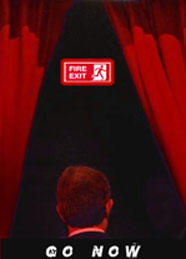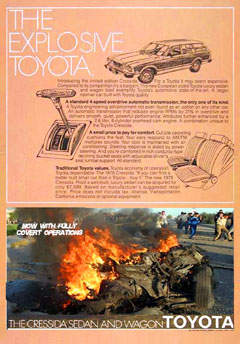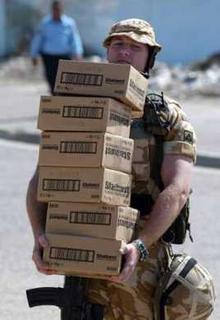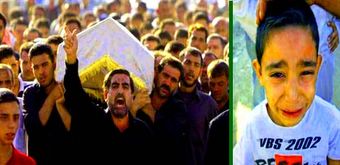tehrantimes: Basra is relatively stable compared to central Iraq where violence involving insurgents, civilians and coalition forces is a daily routine. The city has rarely been a site of clashes between insurgents and coalition troops, nor is it a victim of regular terrorist attacks. This week, however, things changed, but not thanks to Zarqawi and his al-Qaeda link. On Monday, Sept. 19, two British soldiers were arrested and detained by Iraqi police in Basra. Within a matter of hours, the British military responded with overwhelming force, despite subsequent denials by the Ministry of Defense, which insisted that the two men had been retrieved solely through "negotiations."
British military officials, including Brigadier John Lorimer, told BBC News (9/20/05) that the British Army had stormed an Iraqi police station to locate the detainees. Ministry of Defense sources confirmed that "British vehicles" had attempted to "maintain a cordon" outside the police station.
After British Army tanks "flattened the wall" of the station, UK troops "broke into the police station to confirm the men were not there" and then "staged a rescue from a house in Basra", according to a commanding officer familiar with the operation. Both men, British defense sources told the BBC's Richard Galpin in Baghdad, were "members of the SAS elite special forces." After their arrest, the soldiers were over to the local militia.
What had prompted this bizarre turn of events? Why had the Iraqi police forces, which normally work in close cooperation with coalition military forces, arrested two British SAS soldiers, and then handed them over to the local militia? A review of the initial on-the-ground reports leads to a clearer picture.
Fancy dress and big guns don't mixAccording to the BBC's Galpin, reporting for BBC Radio 4 (9/20/05, 18 hrs news script), Iraqi police sources in Basra told the BBC the "two British men were arrested after failing to stop at a checkpoint. There was an exchange of gunfire. The men were wearing traditional Arab clothing, and when the police eventually stopped them, they said they found explosives and weapons in their car. It's widely believed the two British servicemen were operating undercover."
Undercover? Dressed as Arabs? What were they trying to do that had caught the attention of their colleagues, the Iraqi police?
According to the Washington Post (9/20/05), "Iraqi security officials on Monday variously accused the two Britons they detained of shooting at Iraqi forces or trying to plant explosives." Reuters (9/19/05) cited police, local officials and other witnesses who confirmed that "the two undercover soldiers were arrested after opening fire on Iraqi police who approached them." Officials said that "the men were wearing traditional Arab headscarves and sitting in an unmarked car."
According to Mohammed al-Abadi, an official in the Basra governorate, a policeman approached them and then one of these guys fired at him. Then the police managed to capture them.
Booby-trapped Brits?In an interview with Al Jazeera TV, the popular Iraqi leader Fattah al-Sheikh, a member of the Iraqi National Assembly and deputy official in the Basra governorate, said that police had "caught two non-Iraqis, who seem to be Britons and were in a car of the Cressida type. It was a booby-trapped car laden with ammunition and was meant to explode in the centre of the city of Basra in the popular market." Contrary to British authorities' claims that the soldiers had been immediately handed to local militia, al-Sheikh confirmed that they were "at the Intelligence Department in Basra, and they were held by the National Guard force, but the British occupation forces are still surrounding this department in an attempt to absolve them of the crime."
The Special Reconnaissance Regiment and British covert operationsBritish defense sources told the Scotsman (9/20/05) that the soldiers were part of an "undercover special forces detachment" set up this year to "bridge the intelligence void in Basra, drawing on 'special forces' experience in Northern Ireland and Aden, where British troops went 'deep' undercover in local communities to try to break the code of silence against foreign forces."
These elite forces operate under the Special Reconnaissance Regiment and were formed last year by then defense secretary, Geoff Hoon, "to gather human intelligence during counter-terrorist missions."
The question, of course, is how does firing at Iraqi police while dressed as Arabs and carrying explosives constitute "countering terrorism" or even gathering "intelligence"?
The admission by British defense officials is revealing. A glance at the Special Reconnaissance Regiment gives a more concrete idea of the sort of operations these two British soldiers were involved in.
The Regiment, formed recently, is "modeled on an undercover unit that operated in Northern Ireland" according to Whitehall sources. The Regiment had "absorbed the 14th Intelligence Company, known as '14 Int,' a plainclothes unit set up to gather intelligence covertly on suspect terrorists in Northern Ireland. Its recruits are trained by the SAS."
[db emphasis-]
This is the same Regiment that was involved in the unlawful July 22 execution - multiple head-shots - of the innocent Brazilian, Mr. Jean Charles de Menezes, after he boarded a tube train in Stockwell Underground station.According to Detective Sergeant Nicholas Benwell, member of the Scotland Yard team that had been investigating the activities of an ultra-secret wing of British military intelligence, the Force Research Unit (FRU), the team found that "military intelligence was colluding with terrorists to help them kill so-called 'legitimate targets' such as active republicans... many of the victims of these government-backed hit squads were innocent civilians."
Benwell's revelations were corroborated in detail by British double agent Kevin Fulton, who was recruited to the FRU in 1981, when he began to infiltrate the ranks of IRA. In his role as a British FRU agent inside the IRA, he was told by his military intelligence handlers to "do anything" to win the confidence of the terrorist group.
[db emphasis-]
"I mixed explosive and I helped develop new types of bombs," he told Scotland's Sunday Herald (6/23/02). "I moved weapons if you ask me if the materials I handled killed anyone, then I will have to say that some of the things I helped develop did kill my handlers knew everything I did. I was never told not to do something that was discussed. How can you pretend to be a terrorist and not act like one? You can't. You've got to do what they do. They did a lot of murders I broke the law seven days a week and my handlers knew that. They knew that I was making bombs and giving them to other members of the IRA and they did nothing about it. The idea was that the only way to beat the enemy was to penetrate the enemy and be the enemy."Most startlingly, Fulton said that his handlers told him his operations were "sanctioned right at the top this goes the whole way to the Prime Minister. The Prime Minister knows what you are doing."
Zarqawi, Baathists and the seeds of discordSo, based on the methodology of their Regiment, the two British SAS operatives were in Iraq to "penetrate the enemy and be the enemy," in order of course to "beat the enemy." Instead of beating the enemy, however, they ended up fomenting massive chaos and killing innocent people, a familiar pattern for critical students of the British role in the Northern Ireland conflict.
In November 2004, a joint statement was released on several Islamist websites on behalf of al-Qaeda's man in Iraq, Abu Musab al-Zarqawi, and Saddam Hussein's old Baath Party loyalists. Zarqawi's network had "joined other extremist Islamists and Saddam Hussein's old Baath party to threaten increased attacks on U.S.-led forces." Zarqawi's group said they signed "the statement written by the Iraqi Baath party, not because we support the party or Saddam, but because it expresses the demands of resistance groups in Iraq."
The statement formalized what had been known for a year already that, as post-Saddam Iraqi intelligence and U.S. military officials told the London Times (8/9/2003), "Al Qaeda terrorists who have infiltrated Iraq from Saudi Arabia and other Arab countries have formed an alliance with former intelligence agents of Saddam Hussein to fight their common enemy, the American forces." Al Qaeda leaders "recruit from the pool" of Saddam's former "security and intelligence officers who are unemployed and embittered by their loss of status." After vetting, "they begin Al-Qaeda-style training, such as how to make remote-controlled bombs."
Yet Pakistani military sources revealed in February 2005 that the U.S. has "resolved to arm small militias backed by U.S. troops and entrenched in the population," consisting of "former members of the Baath Party" the same people already teamed up with Zarqawi's al-Qaeda network.
In a highly clandestine operation, the U.S. procured Pakistan-manufactured weapons, including rifles, rocket-propelled grenade launchers, ammunition, rockets and other light weaponry. A Pakistani military analyst noted that the arms could not be destined for the Iraqi security forces because U.S. arms would be given to them. Rather, the U.S. is playing a double-game to head off the threat of a Shiite clergy-driven religious movement in other words, to exacerbate the deterioration of security by penetrating, manipulating and arming the terrorist insurgency.
What could be the end-game of such a covert strategy? The view on-the-ground in Iraq, among both Sunnis and Shiites, is worth noting. Sheikh Jawad al-Kalesi, the Shiite Imam of the al-Kadhimiyah mosque in Baghdad, told Le Monde: "I don't think that Abu Musab al-Zarqawi exists as such. He's simply an invention by the occupiers to divide the people."
Iraq's most powerful Sunni Arab religious authority, the Association of Muslim Scholars, concurs, condemning the call to arms against Shiites as a very dangerous phenomenon that plays into the hands of the occupier who wants to split up the country and spark a sectarian war. In colonial terms, the strategy is known as divide and rule.
Whether or not Zarqawi can be said to exist, it is indeed difficult to avoid the conclusion that this interpretation is plausible. It seems the only ones who don't understand the clandestine dynamics of Anglo-American covert strategy in Iraq are we, the people, in the west. It's high time we got informed.
Read moresee: Guardian:
New special forces unit tailed Brazilian
db: The reality is that the UK government[s] have 'previous' when it comes to killing innocents via proxy thugs and madmen. They have previous when it comes to lying to and misleading the gullible UK population. And they certainly have previous when the time comes to control a story and with it the embedded [as in an 'attitude'] media.











